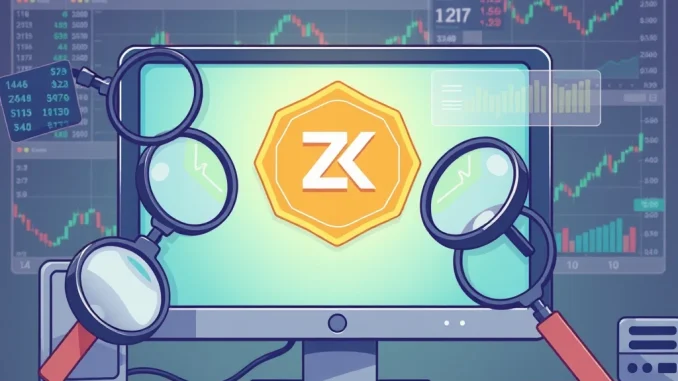
The world of cryptocurrency trading is often subject to dynamic changes, and recent news from South Korea highlights this reality for holders of the ZKsync ZK token. A significant development has emerged from one of the country’s major trading platforms, Bithumb, regarding the status of the ZK token.
What Does Bithumb’s ZKsync ZK Monitoring Mean?
South Korean cryptocurrency exchange Bithumb recently made an important announcement on its official website: the crypto monitoring status for the ZKsync (ZK) token has been extended. This isn’t the first time ZK has been under such scrutiny, and the extension signals continued concerns or ongoing evaluation by the exchange and regulatory bodies.
Being designated a “closely monitored asset” is a serious label in the crypto space. It indicates that the exchange has identified certain factors associated with the asset that warrant increased observation. While it doesn’t automatically mean the asset will be delisted, it significantly raises the risk profile and puts traders on alert.
Potential reasons for a token being placed under monitoring can vary but often include:
- Concerns about market manipulation or price volatility.
- Technical issues with the token’s blockchain or smart contract.
- Low liquidity or trading volume on the platform.
- Issues related to the project’s team, development progress, or community communication.
- Regulatory or legal uncertainties surrounding the asset.
The extension suggests that whatever concerns led to the initial monitoring are either unresolved or require further observation period before a final decision is made regarding the token’s long-term status on the exchange.
DAXA and Crypto Monitoring Status Decisions
The decision to extend ZKsync ZK’s monitoring status was not made unilaterally by Bithumb. According to the announcement, the decision was reached by members of the Digital Asset eXchange Alliance (DAXA). DAXA is a self-regulatory body formed by the major South Korea crypto exchange platforms. Its purpose is to enhance investor protection and promote a safer trading environment through coordinated efforts.
DAXA members include leading exchanges in South Korea, and decisions regarding asset listings, monitoring, and delisting are often discussed and agreed upon within this alliance to ensure consistency and address potential systemic risks. This collective approach underscores the seriousness of the monitoring status for ZK, as it reflects a consensus among multiple key players in the South Korean market.
The alliance’s involvement means that the issues leading to the monitoring are considered significant enough to warrant attention across the member exchanges, potentially impacting the token’s status beyond just Bithumb.
Why South Korea Crypto Exchanges Prioritize Monitoring
South Korea has a highly active cryptocurrency market and has also seen increased regulatory focus in recent years. Exchanges operating in this environment are under pressure to comply with strict regulations aimed at preventing money laundering, protecting investors, and ensuring market integrity. This environment necessitates robust procedures for evaluating and monitoring listed assets.
Platforms like Bithumb crypto operate under close watch from financial regulators. Implementing and enforcing a clear crypto monitoring status system is a key part of their compliance framework. It allows them to formally signal potential risks associated with certain assets to their users and provides a structured process for reviewing whether an asset continues to meet the exchange’s listing criteria and regulatory requirements.
For traders using a South Korea crypto exchange, understanding these monitoring statuses is crucial for managing risk in their portfolios.
Implications for the ZK Token and Investors
The extension of the crypto monitoring status for ZKsync ZK on Bithumb carries several potential implications:
- Increased Uncertainty: The prolonged monitoring period creates uncertainty about the token’s future on the platform, which can negatively impact trading volume and price stability.
- Reduced Investor Confidence: A monitoring label, especially one extended through DAXA, can erode investor confidence in the token’s long-term viability or perceived safety on regulated exchanges.
- Potential for Delisting: While not a guarantee, extended monitoring significantly increases the possibility of eventual delisting if the underlying issues are not resolved to the satisfaction of Bithumb and DAXA members.
- Impact on Liquidity: Traders might become hesitant to hold or trade the token on Bithumb, potentially leading to decreased liquidity.
Investors holding or considering trading ZK on Bithumb should pay close attention to further announcements from the exchange and DAXA. It is vital to understand the risks associated with trading assets under monitoring.
Navigating the Closely Monitored Asset Landscape
For participants in the crypto market, particularly those trading on a South Korea crypto exchange like Bithumb, understanding the implications of a “closely monitored asset” status is essential. When an asset like ZKsync ZK is placed under this label, it’s a signal to exercise caution.
Actionable insights for navigating this situation include:
- Stay Informed: Regularly check official announcements from Bithumb and DAXA regarding the ZK token’s status.
- Assess Risk: Evaluate your exposure to the ZK token on the affected exchange and understand the potential consequences if the status changes further (e.g., moves towards delisting).
- Diversify: Avoid having an overly concentrated position in assets facing monitoring or regulatory scrutiny.
- Understand the “Why”: While specific reasons for ZK’s monitoring extension weren’t detailed in the announcement, research potential general issues that lead to such statuses to better understand the potential risks involved.
The involvement of DAXA crypto alliance highlights the coordinated effort among exchanges in South Korea to maintain market integrity. This proactive approach, while sometimes unsettling for token holders, is intended to protect investors from potentially problematic assets.
Summary: What This Means for ZKsync ZK on Bithumb
In conclusion, Bithumb’s decision, made in conjunction with the DAXA alliance, to extend the closely monitored asset status for ZKsync ZK is a critical development for the token within the South Korean market. It signifies that concerns surrounding the asset persist and require continued evaluation by major exchanges.
This extended crypto monitoring status serves as a formal warning to traders and investors on Bithumb. While the ultimate outcome remains uncertain, the situation underscores the importance of regulatory compliance and asset quality standards for tokens listed on major exchanges. For ZK holders and potential investors, vigilance and informed decision-making are paramount as the situation develops on this key South Korea crypto exchange.



